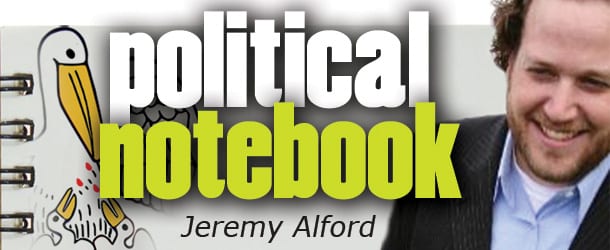While oil prices, and predictions about where they’re going, don’t paint a pretty picture for the state of Louisiana, we’re unlikely to see a true and complete portrait of their effect on the current fiscal year budget until the next governor is sworn in.
Despite assessments from economists that the budgeted forecast for oil prices will not be met, and that other areas of the economy may not pick up the slack, the administration of Gov. Bobby Jindal insists no changes should be expected this calendar year — changes, of course, that would mean less money for an already-ailing budget.
The difference of opinion comes at a time when Jindal is seeking to energize his presidential campaign in early caucus states. State lawmakers are also facing re-election on the fall ballot following a tumultuous session that is prompting opponents to throw mud about votes they took on taxes and the budget.
In pure political terms, no one from the Capitol class could possibly benefit right now from mid-year budget cuts or even a forecast alteration.
That creates a scenario in which the next governor could be saddled with a different financial dilemma that could include not only need for change in the forecasted price of oil for the current budget year, but also immediate spending reductions.
All of the gubernatorial candidates have promised a special session after they take office to improve the tax code and overall budget situation. But Lt. Gov. Jay Dardenne is among the first to say he’ll need a quick special session right off the bat specifically for the 2015-16 budget. “We’re going to need to address that first,” he said.
When asked, the three other major candidates agreed a special session for the current budget year alone could be needed.
Greg Albrecht, the state’s chief economist, said the 2015-16 budget forecast is for oil at $62 a barrel. The actual price now hovers around $40. That doesn’t make for a great result.
While the $62 figure refers only to the annual average price, the slide has been so consistent that it’s becoming difficult to imagine how the average could be reached without a major rally.
“That forecast is unlikely to be made this year. No doubt,” Albrecht said. “What we need to know now is whether there are any offsets that will make up the difference, and we’re still trying to close the books right now on FY15.”
Louisiana loses $12 million for every $1 decrease in the annual average price of a barrel of oil.
The Revenue Estimating Conference (REC), which is charged with determining how much money the state has to spend, meets this month. Some members want the issue on the agenda.
LSU’s Dr. Jim Richardson, who sits on the REC, isn’t optimistic. “Today I do not think there are enough offsets to make up the losses in oil prices,” he said. “No one expects it to bounce back. But again, we can always be surprised if offsets are found.”
Jonathan Walker, director of policy and communications for the Division of Administration, said there will indeed be offsets to make up for the sliding price of oil, starting with more taxes paid by businesses and others in relation to the bills passed by lawmakers this session.
“Some of the revenue measures may come in higher than expected,” he said. “A lot of those estimates (from the session) were purposely conservative.”
That could mean that the bills opposed by business this session, and passed by the Legislature, will have a higher price tag than what was initially thought.
“No one should be surprised about this,” said Stephen Waguespack, president of the Louisiana Assoc. of Business and Industry. “The only question is how high the final tax increase on employers will go.
“When you pass conference reports on tax bills that no one has read in the final moments of session, there are bound to be higher taxes than what was described to the public.”
That the tax bills passed this year could over-perform runs counter to the argument presented earlier this month when the new budget had to be cut by $4.6 million. At the time, it was suggested that the tax bills were not creating enough revenue yet because they had just been added to the books.
Walker said the response from consumers and the industrial sector to low gas prices will also serve as offsets to the declining per-barrel price of oil. As a result, he said, the division does not expect a forecast change.
“We’re optimistic,” he added.
The matter is unlikely to be settled when the Revenue Estimating Conference meets in coming days. Walker said the state may still be in the process of closing the books on the most recent fiscal year at that time. That would provide an incomplete picture of potential offsets.
One of those offsets certainly will not be the volume of oil that is taxed. Crude oil production is off by nearly 17 percent for the first half of this year compared to 2014, and by about half since 2012.
Book To Focus On E. Long’s Last Days
Jack McGuire, the former director of public relations for the city of New Orleans, says the University Press of Mississippi has signed on to publish his forthcoming book Win Or Die Trying: Uncle Earl’s Last Hurrah.
It will focus largely on 1960, when Long was given up for dead politically by friend and foe alike following a year that saw him committed to mental institutions in two states before engineering his own release — only to miss the runoff for lieutenant governor.
“Politics was his life, and he viewed the 1960 8th Congressional District campaign as a way to rejuvenate his career despite warnings that it could cost him his life,” McGuire added.
Long defeated Congressman Harold McSween in that race. But he died a few days later, before he could take the seat. He made as many as 10 stump stops a day, McGuire said, exhausting himself in the summer heat.
“When a cousin told him he had to ease up, that the effort was going to kill him, he said that he would rather win and die than lose and live,” the author wrote in an email. “It is a really incredible story.
“The first part of the book traces his political life until then, and then covers the congressional race. Harold McSween became a close friend and told me much about that contest in letters and interviews, but asked that I publish none of it until after his death.
“There is much information about Long that humanizes him, from his farm manager’s daughter whom he loved like his own; his driver Ellis “Easy Money” Littleton; Robert Gentry, who was then in college and was Earl’s PR man; and others.
“[The book] will contain numerous photos of [Long] in action.”
A publication schedule is still being worked out for the tome.
McGuire co-wrote Louisiana Governors: Rulers, Rascals, and Reformers in 2009.
Guillory Doubles Down On Controversy
State Sen. Elbert Guillory, a Republican from Opelousas, grabbed headlines around Louisiana in mid-August for his first campaign commercial as a candidate for lieutenant governor. The reason? The commercial included a line of dialogue in which the N-word was used.
Now Guillory is promoting a new web video that uses the term several times over — as well as various other words that many would describe as bigoted.
The new web video, paid for by his campaign, has Guillory, along with others, saying the N-word eight different times in an effort to explain that it might have different meanings to different people.
In the spot Guillory also wears a wig, a cowboy hat, appears to spit on the ground and lets loose a string of racial descriptions to cover a variety of ethnicities ranging from Italian-Americans and Native Americans to those of Asian descent.
“Let’s talk and get past race,” Guillory says in the web video.
The first campaign commercial, which aired twice in the New Orleans market, featured Guillory speaking to the late Martin Luther King Jr. and then taking to the pulpit in an empty church. It also plays an alleged recording of former President Lyndon B. Johnson using the N-word.
Baton Rouge Mayor Kip Holden, who is also running for lieutenant governor, has been highly critical of Guillory’s original commercial. Holden’s stand resulted in a brief but very public back and forth between the men.
Among those also running for lieutenant governor are former Plaquemines Parish President Billy Nungesser and Jefferson Parish President John Young.
Pro-Vitter Super PAC Preps $2 Million Buy
One of the big unanswered questions of the governor’s race can now be answered. The Fund For Louisiana’s Future, a super PAC supporting U.S. Sen. David Vitter’s campaign, has started laying down television buys, and its material is already on the air.
The initial buy included television and broadcast. It will help the super PAC eventually build toward an expected $2 million media budget between now and the primary election on Oct. 24. That’s $250,000 a week on average.
The buy represents the kickoff of what could be the largest TV buy from any single entity so far this cycle. Super PACs are allowed to raise unlimited amounts of money.
“You’re really going to stand out with that kind of investment,” said Eric Morgan, the managing partner of the New Orleans-based Morgan & Co., a media planning and buying agency not involved with the current statewide election cycle. “The fact that others will be running on television at the same time will not diminish it. This is a big amount, and something we do not see that often for just a two-month period. It’s not earth-shattering, but it is enough to adequately cover the entire Louisiana market.”
Among those also running for governor are Public Service Commissioner Scott Angelle, Lt. Gov. Jay Dardenne and state Rep. John Bel Edwards.
For more Louisiana political news, visit www.LaPolitics.com or follow Jeremy Alford on Twitter @LaPoliticsNow.














Comments are closed.